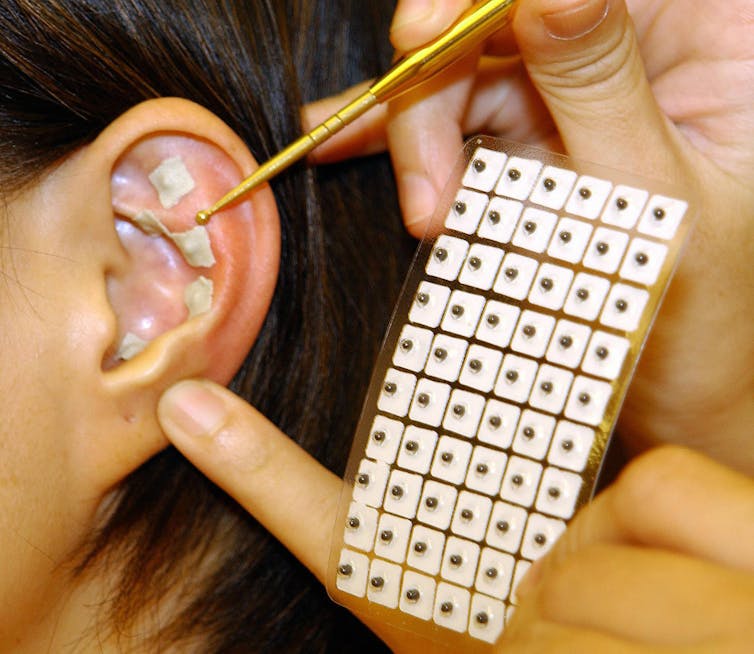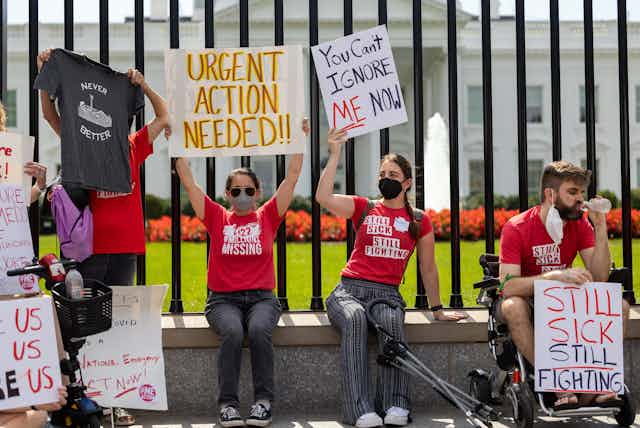When Giselle Boxer recently pitched her brand of a needle-free form of acupuncture known as “ear seeds” to the investors on BBC’s Dragons’ Den, it started a medical controversy.
Boxer told the Dragons that ear seeds had been part of a “personal healing journey” that she believed helped her recover from the debilitating condition ME (myalgic encephalomyelitis, also known as chronic fatigue syndrome) within 12 months.
Despite presenting no clinical evidence for the efficacy of Acu Seeds, Boxer made TV history by attracting offers of investment from all six of the Dragons.
However, following objections by doctors, charities, ME patients, and almost five hundred complaints to the UK’s broadcasting standards authority Ofcom, the BBC removed the episode from its streaming platform for review.
An edited version was later reinstated with the following disclaimer: “Acu seeds are not intended as a cure for any medical condition and advice should always be sought from a qualified healthcare provider about any health concerns.”
Boxer responded by saying she “never said the ear seeds are a cure”, adding: “I have always said ME is a complex condition and that a combination of healing approaches is what I believed supported my recovery.”
So why did Boxer’s pitch prove so successful – and controversial?
On the show, she described the dire effect of the condition on her life, explaining how she “went from working in a top advertising agency with a busy social life and exercising regularly to being mostly housebound, unable to walk for more than five minutes without having to get back into bed”. She said was told by doctors that she “would never recover, work again or have children”.
Her account will be familiar to the 17 million to 24 million patients worldwide with ME. It’s little surprise, then, that her suggestion of a simple treatment such as ear seeds could help attracted such attention.
Ear seeds are used in a form of alternative therapy known as auricular therapy or ear acupressure. This involves the application of tiny seeds or pellets to specific points on the ear. These seeds are secured with adhesive tape and left in place to stimulate acupressure points.
The practice is a form of traditional Chinese medicine based on the idea that specific points on the ear correspond to various organs and systems throughout the body.
The stimulation of acupressure points is said by proponents to have therapeutic effects including pain relief, stress reduction, improved sleep and enhanced energy flow. However, robust scientific evidence supporting their therapeutic use does not exist.
No cure
The reality is that ME patients face a complex, long-term medical condition without hope of a quick recovery. Patients experience persistent and debilitating fatigue that affects all aspects of their daily lives. Over half of patients are unable to work and a quarter of patients are bed- or housebound.
The hallmark symptom of ME is post-exertional malaise, when minimal physical or cognitive activity worsens other ME symptoms such as tiredness, pain, difficulty thinking, sleep problems, sore throats, headaches and feeling dizzy.
In most patients, ME onset follows an infection. The exact disease mechanism is unknown, with research suggesting disturbances in the immune and nervous systems, the gut and energy production.
There is no cure for ME. Instead treatments focus on symptom management. Recommendations include fatigue-, pain- and energy-management tecniques. For some patients, cognitive behavioural therapy will be offered, as ME is a life-changing illness with many patients going on to develop depression, stress, or anxiety.

The debilitating nature of ME and the lack of effective cures need to be addressed through properly funded, biomedical research into its causes, so we can develop evidence based treatments. This is one of the reasons Boxer’s claims caused such dismay.
Despite the absence of scientific evidence for ear seeds, the controversy seems to have benefited the brand – the week after the show had aired, Boxer said “I sold more than double my sales for two years in just one night.”
This is unsurprising considering that ME patients are desperate for effective treatment, especially given the historic lack of health system support for the condition.
A serious under-investment in rigorous biomedical research into ME has meant that the illness remains somewhat of a mystery. The absence of proven or effective treatments has created an environment allowing unproven treatment claims to thrive and potentially mislead vulnerable patients.
Addressing this gap in research funding is crucial for promoting scientific integrity and ensuring that treatments are grounded in robust scientific evidence.
The Conversation contacted Acu Seeds for comment but did not receive a response.

